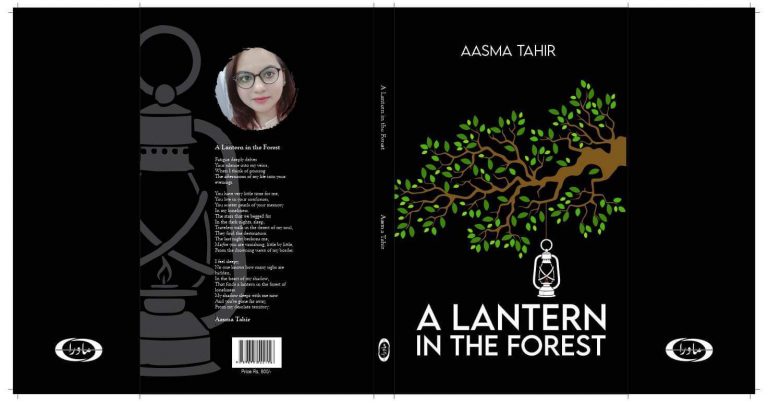
In all her verses we hear the breath, the vital breath that only true love teaches. Her poems range from the intimate place of the heart, telling stories and singing silently.
 Aasma Tahir hailing from Lahore, Pakistan, is a poetess of English and Urdu languages. She has done Masters in English Literature, and is the member of World Nations Writers’ Union. Her writings have been published in several Anthologies and national and international literary magazines and websites. Recently her poetry book “A Lantern in the Forest” has been published. Her interview along with fifteen English poems has been selected in an Anthology “Postmodern Voices” published from India. As an internationally recognized poetess, she recently achieved membership of World Nation Writers’ Union, Kazakhstan and an award “Paragon of Hope” awarded by World Nations Writers’ Union. She was also invited in World Peace Summit, Nigeria by World Institute for Peace to present her poetry. Her English poem “Woman of Art” has been selected in an Anthology of English Poetry ‘Emerging Horizons’ published from India. Moreover, her English poem “Blood Festival” has been selected in an Anthology ‘Jallianwala Bagh Poetic Tributes’ published from India. Her poems “Daemonic Tales”, “Breathing in Love” and “Imitation of Life” have been published in BHARATHVISION.INFO (online magazine, affiliated with ‘Motivational Strips’). Her acrostic poem “Romance” got the first position in Tunisian Asian Poetry contest and received winner certificate.
Aasma Tahir hailing from Lahore, Pakistan, is a poetess of English and Urdu languages. She has done Masters in English Literature, and is the member of World Nations Writers’ Union. Her writings have been published in several Anthologies and national and international literary magazines and websites. Recently her poetry book “A Lantern in the Forest” has been published. Her interview along with fifteen English poems has been selected in an Anthology “Postmodern Voices” published from India. As an internationally recognized poetess, she recently achieved membership of World Nation Writers’ Union, Kazakhstan and an award “Paragon of Hope” awarded by World Nations Writers’ Union. She was also invited in World Peace Summit, Nigeria by World Institute for Peace to present her poetry. Her English poem “Woman of Art” has been selected in an Anthology of English Poetry ‘Emerging Horizons’ published from India. Moreover, her English poem “Blood Festival” has been selected in an Anthology ‘Jallianwala Bagh Poetic Tributes’ published from India. Her poems “Daemonic Tales”, “Breathing in Love” and “Imitation of Life” have been published in BHARATHVISION.INFO (online magazine, affiliated with ‘Motivational Strips’). Her acrostic poem “Romance” got the first position in Tunisian Asian Poetry contest and received winner certificate.
Moreover, her English poems “A New Moon of the Deep Chasm”, “Imitation of Life” and “The Lost File of Love” have been published by Sir Sajid Hussain in his book ‘A Bouquet of Triple Colours’. Her several poems have been translated in Bangla language and published in the newspaper ‘The Daily Gour Bangla’.
A Lantern in the Forest
Comments from Stefania Miola
Caselle Torinese, Italy
“Oh, dear soul! Hotels are empty,
Waiting for the first-night couples.
Let’s turn off the lanterns!
Let the night itself sleep
In the forest of eternity…
See Virgin Beauty! On the snowy mountain… “
Poetry dwells in the heart of the poet, in the heart of Aasma Tahir. Her verses lead the reader into her universe, into the depths of her being. Beautiful valleys and the land of wonders are now visible before the eyes.
A place where the souls dance in ecstasy take shape, the rooms emit light of the moon and the scent of flowers hovers, where dreams are like nightingales that appear and then disappear in the storms of life.
In all her verses we hear the breath, the vital breath that only true love teaches. Her poems range from the intimate place of the heart, telling stories and singing silently. In the title of the poetic collection, ‘A Lantern in the Forest’, the poetess approaches an image of the fire which burns in the container that encloses it: The Lantern.
This is a suggestive image that we would all be able to imagine in an instant, in our minds, so much so are we used to considering it part of our history or common imagination. We could already draw a lesson from this characterization, and approach the lantern to their protective function of something residing within it: the lantern as a tool to protect the flame it contains.
If we imagine that we are in the dark at windy night, with only our lantern in hand, it is easy for us to think how we would be magnetically attracted to the only possibility that we are given to see around us: the lantern itself. The flame is a source of light. The strongly evocative scene can be traced back to a sweet illumination of divine origin. The word “flame”, what it illuminates, can rise, symbolically or not, to the function of a guide along an itinerary, a path. In the famous anecdote that sees as the protagonist the Greek philosopher Diogenes of Sinope, or Diogenes the Cynic, who lived in the 5th-4th century BC.
On a sunny day, he presented himself with a lantern in the open air, and to the questions posed to him about this apparently meaningless act, he replied: “I’m looking for a man”. Diogenes was referring to a search for the true man who lived according to his authentic nature, not oppressed by social conventions and the slavery of necessities. But beyond the meaning of this phrase, the lantern here rises to a great symbol of research, of guidance in a process of investigation. The lantern in the container of the burning flame would represent the soul.
“The whole city sleeps in the lap of heaven” she writes in one verse. We, in the womb of life, continue to descend into the deep valley of peace with the arduous task of leaving the light on in ourselves to always believe in the images of the heart.
_______________
 Stefania Miola is an eminent Poetess, Art Critic and Journalist from Italy. Since 2015, her three books have been published – “One sky – the only true one”, “Violets in the Desert” and “The scent of the white rabbit”. All books are awarded nationally and internationally. Her several poems are present in anthologies of various publishing houses.
Stefania Miola is an eminent Poetess, Art Critic and Journalist from Italy. Since 2015, her three books have been published – “One sky – the only true one”, “Violets in the Desert” and “The scent of the white rabbit”. All books are awarded nationally and internationally. Her several poems are present in anthologies of various publishing houses.